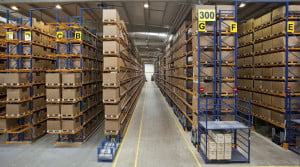
What Is a Distribution Management System?
A distribution management system (DMS) is a collection of applications designed to manage the process of moving goods from the manufacturer to the end user. This process involves many players including suppliers, wholesalers, retailers, and consumers.
A DMS is an integral part of every business that is involved in manufacturing, distribution, packaging, storage, warehousing, order-taking, and wholesale. If your business works with any of these processes, you need to find and implement top distribution management software to manage these activities.
This system is a component of an organization’s enterprise resource planning (ERP) solution that is designed to streamline core processes for greater productivity and smooth the operations of an organization. Before you begin the implementation of a DMS, make sure you fully understand what it is and how to choose the right one for your business.
Distribution Management Systems Explained
A DMS streamlines the various workflows and procedures involved in the distribution of goods. It improves the entire supply chain and eliminates problems that create understocking and overstocking. A Distribution ERP gives manufacturers access to real-time data from their distributors, enabling them to make well-informed decisions regarding their business and distribution workflows.
This system is a fundamental part of your business’s route-to-market strategy, which determines the distribution channels to use to ensure your products get to the intended consumers promptly. It simplifies the management of supply chain workflows between you and your distributors by ensuring that the core activities (e.g., retail, inventory, promotions, invoicing, competitive insights, and claims) are properly aligned.
With the right DMS, you can easily boost your sales and core distribution processes, even in unstable marketplaces. Ensure the DMS you want to implement in your business is the ideal solution for your organization.
Choosing the Right Distribution Solution for Your Business
There are many DMS products on the market. Be sure to choose yours carefully, as some systems are more advanced and robust than others. Here are some considerations to keep in mind when searching for a DMS for your business:
Efficiency
Start by figuring out the kind of DMS that suits your company’s distribution needs. Consider your current distribution processes to ensure that the DMS you choose can effectively streamline them end-to-end.
A quality system should be able to automate entire distribution processes, including approvals and notifications. This improves productivity and efficiency throughout the distribution network.
Your DMS should be able to gather real-time information from your distributors so that you can have enough practical insights to make speedy and well-informed decisions. Make sure the system’s access is universal, with a web portal and an application that can improve its efficiency. It needs to be user-friendly and easy to adopt if you want your technology investment to pay off.
Usability
Before you implement a DMS in your business, make sure everyone in the company can use it effortlessly. Remember–the reason for implementing this system is to streamline core distribution processes.
Consider implementing a customizable DMS because it will allow you to include features and functionalities that align with your specific distribution needs. Your DMS solution should fully support your business model in all respects.
For instance, it should help you manage all resources involved in your supply chain, enabling you to understand the current and future flow of resources through each touchpoint. Make sure the system can handle your stock and orders efficiently to avoid unnecessary delays and lags in your supply chain. Additionally, you should choose a DMS that can easily identify categories of products being distributed in order to appreciate the criticalness of any delays.
Scalability
A DMS should be scalable, allowing you to adjust operations smoothly as needed. If you’re a small-scale manufacturer, have a plan on how to expand your business as you grow.
Unlock Operational Success
When you invest in a DMS, make sure it can be scaled up easily in the future so that you don’t have to spend more money implementing a new system. It should also be easily adaptable so that it can seamlessly integrate with other systems used by your company.
Lastly, make sure you choose your DMS from a reliable and well-established company that offers the necessary support during and after implementation. Check out Navigator Business Solutions–we offer a wide range of advanced ERP solutions that help businesses like yours easily streamline their operations.

